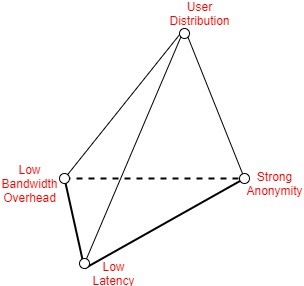Anonymity Research
Welcome to the Anonymity Research Webpage!
We design and analyze efficient, provably secure cryptographic solutions for anonymity networks (e.g., Tor) and privacy in the emerging scenarios (e.g., online advertising) over the Internet. Recently, we are also pursuing topics such as finding lower-bounds on communication anonymity, and bootstrapping censorship-evasive communication.
Publications
- Anonymity Trilemma: Strong Anonymity, Low Bandwidth Overhead, Low Latency — Choose Two.
Debajyoti Das, Sebastian Meiser, Esfandiar Mohammadi and Aniket Kate.
IEEE S&P (Oakland) ‘17. [PDF]
Theory of Anonymity
Anonymity Trilemma
Strong Anonymity, Low Bandwidth Overhead, Low Latency — Choose Two.
This work investigates the fundamental constraints of anonymous communication (AC) protocols. We analyze the relationship between bandwidth overhead, latency overhead, and sender anonymity or recipient anonymity against the global passive (network-level) adversary. We confirm the trilemma that an AC protocol can only achieve two out of the following three properties: strong anonymity (i.e., anonymity up to a negligible chance), low bandwidth overhead, and low latency overhead.

We further study anonymity against a stronger global passive adversary that can additionally passively compromise some of the AC protocol nodes. For a given number of compromised nodes, we derive necessary constraints between bandwidth and latency overhead whose violation make it impossible for an AC protocol to achieve strong anonymity. We analyze prominent AC protocols from the literature and depict to which extent those satisfy our necessary constraints. Our fundamental necessary constraints offer a guideline not only for improving existing AC systems but also for designing novel AC protocols with non-traditional bandwidth and latency overhead choices.
For more information, follow the project webpage.